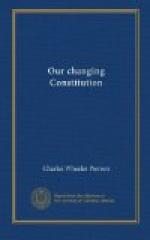[Footnote 3: State of Mississippi v. Andrew Johnson, 4 Wall., 475.]
[Footnote 4: Dred Scott v. Sandford, 19 Howard, 393.]
The power of the Court to declare legislative acts unconstitutional is subject to another important limitation. The judicial power is limited by the Constitution to actual cases and controversies between opposing parties. The Court cannot decide moot questions or act as an adviser for other departments of the government. A striking illustration is found in the so-called Muskrat case.[1] Congress having legislated concerning the distribution of property of the Cherokee Indians, and doubts having arisen as to the constitutional validity of the legislation, Congress passed another act empowering one David Muskrat and other Cherokee citizens to file suit, naming the United States as defendant, to settle the question. The Supreme Court declined to take jurisdiction and dismissed the suit, holding that it was not a case or controversy between opposing parties within the meaning of the Constitution.
[Footnote 1: Muskrat v. United States, 219 U.S., 346.]
Still another limitation is encountered in cases involving abuse of legislative power rather than lack of power. If Congress passes an act within one of the powers expressly conferred upon it by the Constitution, for example the power to lay taxes or the power to regulate interstate commerce, the Supreme Court cannot interfere though the incidental effect and ulterior purpose of the legislation may be to intrude upon the field of state power. We shall have occasion to refer to this limitation more than once in later chapters.
An impression is abroad that the Supreme Court has plenary power to preserve the Constitution. Hence the tendency of groups to demand, and of legislators to enact, any kind of a law without regard to its constitutional aspect, leaving that to be taken care of by the Court.
Any such impression is erroneous and unfortunate. It puts upon the Court a burden beyond its real powers. It undermines the sense of responsibility which should exist among the elected representatives of the people. It impairs what someone has called the constitutional conscience, and weakens the vigilance of the people in preserving their liberties. Men and women need to be reminded that the duty of upholding the Constitution does not devolve upon the Supreme Court alone. It rests upon all departments of government and, in the last analysis, upon the people themselves.
III
OUR CHANGING CONSTITUTION
In a celebrated case[1] decided a few years ago the Supreme Court of the United States said:




